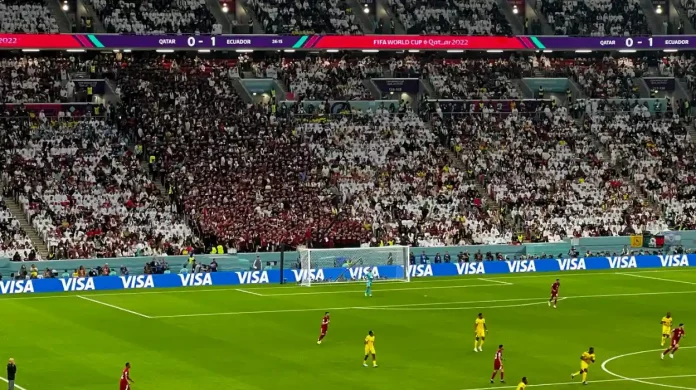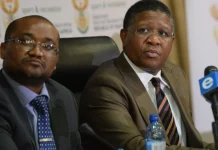The Free State Toyota Stadium in Bloemfontein was approved by the Confederation of African Football (CAF) and FIFA to host some of the major 2026 FIFA world cup qualifiers in the month of September 2025. The stadium was once a proud place in the 2010 world cup, but has since been neglected. Though initial inspections showed a deteriorating pitch and a poor facility, the facility was approved to host the fixtures of South Africa vs. Lesotho and Nigeria.
This move elicited a lot of criticism among football stakeholders in Africa. The state of the turf with its visible cracks and crumbling infrastructure raised many questions about the readiness of the stadium. The authorities with the approval procedure also attested that small final minute renovations barely passed the mark. Nonetheless FIFA and CAF permitted the matches to continue and it has been argued that the safety, fairness and quality were not appropriately taken into account.
This is not a problem of the stadium per se. Lesotho has no FIFA approved stadium and had to play its home game against South Africa in Bloemfontein which was in effect giving their opponent a home advantage. This creates both ethical and logistical issues regarding the way FIFA addresses infrastructure deficiencies in developing football countries and the impact of these decisions on competitive imbalance.
Inconsistencies In FIFA’s Venue Standards Enforcement
The FIFA world cup qualifiers have infrastructure standards that aim to guarantee uniformity, security and equity. The choice to grant Free State Stadium the green light regardless of its obvious shabbiness, however, points at deficiencies in formal guidelines versus actual compliance. The South African coach, Hugo Broos, acknowledged that the conditions of the pitch were not nearly perfect, but the team had to cope. Team employees and players were privately worried about possible injuries and training complications in the run-up to the fixtures.
This has resulted in criticism of FIFA due to the credibility of its governance. The seemingly lax attitude of the global body towards allowing poor facilities in African qualifiers is in contrast to a tightening of standards elsewhere, which further supports worries over disproportionate treatment of football federations based on geography and political influence.
The process of approval has been mentioned by local football analysts as hasty and opaque. Although the representatives of South African Football Association (SAFA) said that they did their best to address the requirements of compliance, the pitch and facility works were insignificant and more or less cosmetic. Observers argue that FIFA’s leniency in this instance sets a dangerous precedent where temporary fixes are accepted in place of genuine long-term improvements.
Pressure From Schedules And Logistics
Part of FIFA’s motivation may have stemmed from scheduling constraints and limited options for alternative venues. With a deadline to meet the match and the regional stadiums unable to be certified fully, Free State Stadium might have appeared to be expedient. However, this convenience has been criticized as placing the convenience of logistics over the safety and competition fairness that should be associated with a global tournament qualifier.
Lacking a consistent ability to maintain its regulatory framework, FIFA threatens to undermine the integrity of the qualifying competition and casts doubt on the validity of match results. In a group with close contention, this type of decision can impact not only results, but also feelings of bias and process breakdown.
Structural Inequality And Infrastructure Gaps In African Football
The episode with Free State Stadium reflects the same issue that is persistent in African football: a dramatic infrastructure gap between the poorer and the richer federations. Although South Africa was able to renovate a dilapidated facility on short notice, some countries, such as Lesotho, have no FIFA-sanctioned grounds, which will result in logistic dependencies and disadvantages with regards to home reinforcements.
The mission of FIFA is to support football development in all the regions. But the fact that there are still no stadiums in a number of African countries indicates structural underinvestment. Their opponents accuse them of lacking an oversight, yet of lacking serious policies of development that would correct such structural inequalities. Allowing South Africa to host a match for Lesotho on its soil is not a solution, it is a symptom of uneven progress.
The situation raises questions about whether FIFA’s developmental priorities are adequately focused on infrastructure equity. Longstanding calls for more robust support for stadium upgrades in smaller nations have largely gone unanswered. Without intervention, the competitive integrity of tournaments like the World Cup qualifiers will remain vulnerable to disparities rooted in infrastructure.
Blurred Lines Between Politics And Football
Some commentators have proposed that FIFA could be influenced by political issues in the decision making processes, particularly where regional federations are influential. Although no direct proof of favoritism can be found in this case, transparency and the timing of decisions to approve the stadium have been questioned. The impression that bigger or stronger federations are handled lightly, whereas smaller countries are left to soldier on with logistical challenges, goes against the very essence of equality in sport.
Commentators indicated that once the choice was made to allow matches in Free State Stadium, it was not a matter of physical security but also of principle. Assuming that all teams will play by the same rules, then the conditions of the venue cannot be so different according to the geography or the political influence.
Safety And Match Quality Implications
Poor playing fields not only lower the quality of a match but also increase the chances of a player being injured. The medical guidelines of FIFA itself state that the turf should be predictable and not volatile in order to avoid injury. Both South African and Nigerian players said privately that the rough field made playing difficult and physical exertion more powerful, especially when they were training before a game.
Poor pitch conditions also compromise the quality of football on display. For global spectators and local fans alike, qualification matches are moments of national pride and international visibility. When matches are decided by uncontrollable field conditions rather than skill, it casts doubt on results and undermines public trust in the fairness of competition.
Morale And Preparation Challenges
More than just physical safety, the emotional impact on the players and the coaching staff can influence the morale of the team. Training in unfortunate and inadequate circumstances may affect psychological preparation, especially where the stakes are involved. The positions of the groups in the African qualifiers are close, and every game can be followed by a transformation of the table.
The Bloemfontein stadiums turned into a hot topic among the teams participating in the event and made some look at FIFA as a body that had given tournament integrity second priority. No injuries were reported at the matches, but the larger question, whether such conditions are to be allowed in future qualifiers at all, is open.
Accountability And The Road To Reform
With FIFA under new pressure to be transparent, the Free State Stadium incident has become a scapegoat of the wider discontent with the venue policy of FIFA. Others like Oluwashina have observed that reforms should be introduced and that the world cup qualification process is based on FIFA imposing uniform and equitable standards in the hosting nations.
“We did something bad, but there was no complaint and the rule says if there’s no complaint, there’s nothing.”
South Africa coach Hugo Broos on a possible FIFA sanction for using an ineligible player in 2016 World Cup qualifier vs Lesotho.🎥@Diskifans pic.twitter.com/laR2fxVEEh
— Olúwashínà Okeleji (@oluwashina) August 30, 2025
In this regard, the following recommendations can help to improve the situation: the establishment of an independent checking body, the further building of stadiums in less-invested countries, the elaboration of the international system of generally accepted principles of approval procedures of the sites. These measures, its supporters believe, are essential in restoring trust and to make sure that all countries, no matter the level of economic development, can play on the same playing field.
Now FIFA is at a make-or-buy crossroad with one year left until the world cup 2026 preparations. Its decisions, not just on future stadium approvals but also its future investments in infrastructure equity will show whether the organization is indeed devoted to developing a truly global sport based on fairness, safety, and respect.













